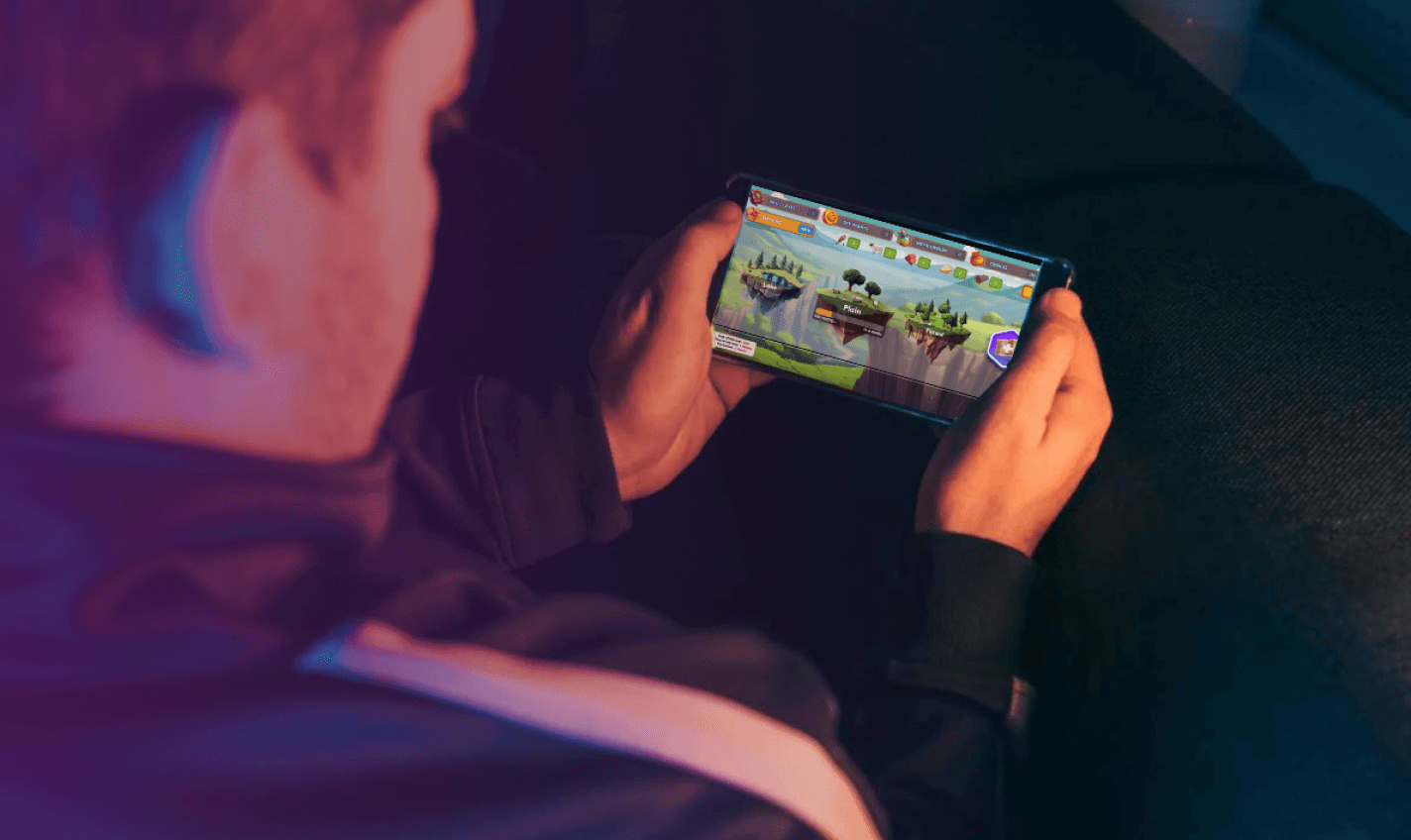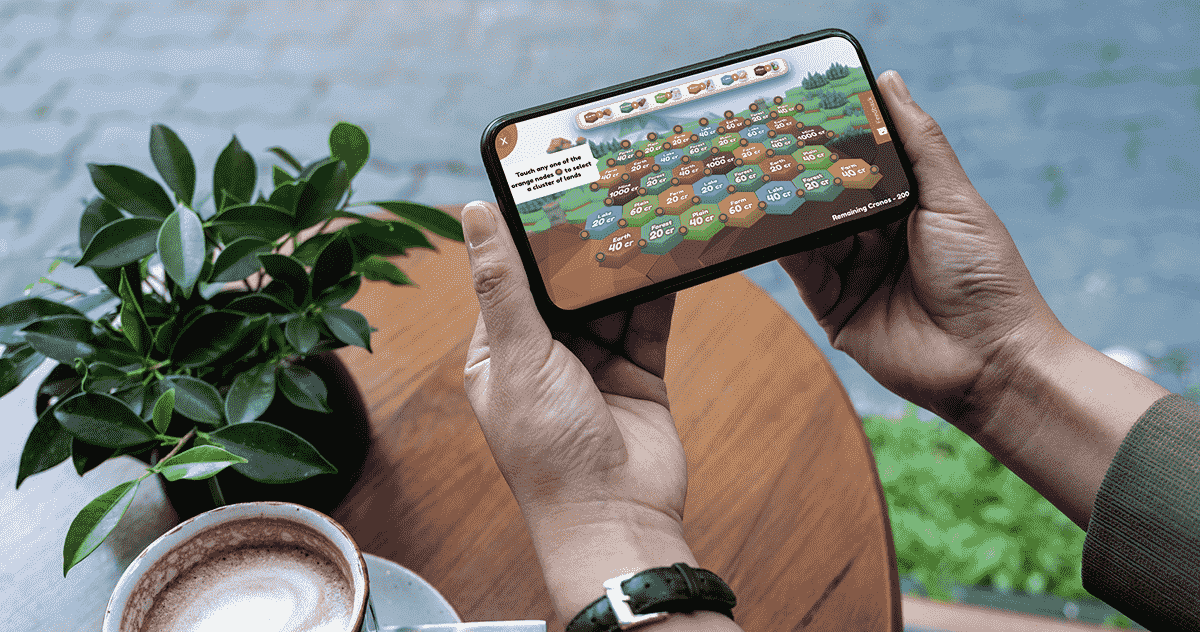Evolving Landscapes
“The measure of leadership is not just the decisions you make, but the impact those decisions have on others". Through these words, John Maxwell manages to convey both the utmost importance and the intricate nature of leadership.
In today's rapidly changing business landscape, strong leadership skills are now a necessity rather than a preference. Traditional training methods often fall short in adequately equipping individuals to address the constantly emerging and evolving complex challenges encountered by organizations, leaders, and employees.
The question then arises: How can individuals be well-equipped for these dynamic and ever-changing times?
This is where 'Evivve: The Leadership Game' steps in with an engaging and unique play-based approach to skill enhancement that transcends traditional training methods.
‘Evivve’ Origin Story: Where it All Began
Each of us is shaped by our personal journey. For the designer, immersive game experiences during his formative years like Sid Meier’s ‘Civilization VI’ and many others, shaped his understanding of the world – concepts like business, economy, virtues, values and many more. Driven by a deep passion for the power of design, play, and self-directed learning, he is inspired to craft game experiences that are both impactful and meaningful.
The idea behind 'Evivve: The Leadership Game' originated from a conversation with the project manager and head of a prominent communication devices company. The manager described how the company's project leaders were all caught up in a competition to meet their targets. This often led them to take on more projects than they could handle, which was also negatively affecting the company's reputation.
The intended shift in behavior aimed to encourage these leaders to transition from competition to collaboration, fostering teamwork and open communication among them.
With a desire to address this problem statement, the concept of 'Evivve: The Leadership Game' was born.
What is 'Evivve: The Leadership Game'?
'Evivve' is a Multiplayer Game-Based Learning Tool for leadership skill and team development, drawing insights from Applied Behavior Sciences and Neurolinguistics. Crafted to mirror the dynamics of team engagement found within professional settings, this tool simulates both inter- and intra-team interfaces. It involves participants taking on roles where they need to make decisions, solve problems, communicate effectively, and guide their group towards a common goal.
The game revolves around acquiring ‘Movilennium’, a unique in-game resource, as its central goal. A distinctive feature is the ‘offers system’, wherein players must decide whether to accept or decline offers that impact their progress towards the goal. This mirrors competition in real work scenarios and introduces a layer of complex decision-making.
As participants immerse themselves in the gameplay, they are very likely to get derailed by the numerous small tasks that are essential to be able to ultimately win. Teams that work together and hold each other accountable along the way win the game.
Eventually, the game functions as a reflective tool, fostering communication, strategic thinking, and collaboration.
What Sets 'Evivve' Apart?
'Evivve' is a powerful learning tool because of its holistic approach to play, design, and self-directed learning. Here's what makes ‘Evivve’ unique:
Game-Based Learning
Unlike many learning games that rely on extrinsic motivation like leaderboards, rewards and badges, 'Evivve' focuses on intrinsic motivation.
The game is designed to power up synchronous learning experiences that foster immediate feedback, real-time interaction and a sense of shared participation, making it conducive for discussions, clarifications and collaborative learning.
Immersion
The game employs storytelling techniques, scenario-based learning, relatable characters based on user personas, and captivating gameplay mechanics to craft an immersive setting.
Within this world, players instinctively resort to their authentic behaviors to tackle challenges.
As the game progresses, through feedback mechanisms and introspection, players evolve from mere information receivers into instructors and enablers of teamwork and collaboration.
Experimentation
Traditional training experiences often involve disseminating information without providing spaces for practical application or adaptation.
In 'Evivve', players aren't always told what to do so they can experiment with different actions and choices, especially when they play multiple rounds of the game. This way, they can communicate, explore new ideas and fix what's not working.
The real power lies in being able to test out new thoughts, see different perspectives, make mistakes, and open up to new ways of thinking. That's what makes this active learning tool powerful.
Reflection
Facilitators play a pivotal role in aligning the game's objectives with desired outcomes and in predefining reflective questions. Reflection is the cornerstone that elevates the ‘game’ to a meaningful learning experience.
Post gameplay, learners are encouraged to introspect and discuss their actions and decisions – both their productive and counterproductive behaviors. This paves the way for a significant learning opportunity where the learning transcends the game and has a real-life impact where the players internalize and apply the behavior change outside the game.
Proven Effectiveness
‘Evivve’ has proven effective in enhancing a range of skills such as communication, collaboration, leadership, resilience, emotional intelligence, and coaching.
While the gameplay remains consistent, the focus shifts by adjusting the lens or filter through which participants analyze their experience. This adaptability empowers facilitators to present targeted reflective questions, extracting invaluable insights from the outcomes of the game.
Adaptability
'Evivve' adapts to diverse learning objectives. It aligns with frameworks like Agile Principles, the Emotional Intelligence Mixed Model, and Gamification & Behavioral Design Frameworks. This adaptability enables customization and personalization.
You can take any of your current leadership skill development learning programs and convert them into an engaging and immersive version that can be facilitated using ‘Evivve’!
Decoding the ‘Game’ in 'Evivve'
While the concept of a game can encompass a wide array of elements and mechanics, certain fundamental concepts like rules, objectives, interactivity, and player engagement remain at the core of its definition.
Many game theories and frameworks help us understand these elements from different lenses, like the very popular MDA (Mechanics, Dynamics, Aesthetics) framework that was first introduced by Robin Hunicke, Marc LeBlanc, and Robert Zubek.
The Octalysis Framework for Gamification & Behavioral Design emphasizes “Human-Focused Design” by optimizing human motivation and engagement within a system.
Another captivating concept that captures the essence of a game is the "Magic Circle”- a term first coined by Huizing and then later modified by Salen & Zimmerman in the game design context.
In game design, this circle comprises three key components:
- The Player: The individual engaging with the game.
- The Play: How the player interacts with and perceives the game.
- The Game: The space defined by rules and goals.
In essence, a game can be described as:
‘a structured form of play that involves participants, known as players, engaging in activities within a defined set of rules and constraints to achieve objectives, overcome challenges, and derive enjoyment, entertainment or learning.’
Let’s explore how 'Evivve' aligns with the core concept of a ‘game’:
Objective
Powerful storytelling plays a pivotal role in establishing the objective in 'Evivve'. The game has a clear goal - to get Movelennium. They must collect enough Movelennium as a group to win the game.
This objective provides a sense of purpose and direction for the players' actions and fosters skills of communication, decision-making and strategizing.
Rules
The game is governed by specific rules that outline what actions are allowed or prohibited within the game world. The gameplay in 'Evivve' revolves around three simple actions: harvest land, trade resources, and mine Movelennium.
The mechanics of the ‘offers system’ allows them to accept or reject offers with the rule that once an offer is accepted, it disappears for the rest of the group. These rules and constraints determine how the players interact with the game and create challenge and motivation to achieve their goal.
Interactivity
Interactivity is a core aspect of games that distinguishes them from passive forms of learning. Players actively engage with the game through their decisions, actions, and choices. Reflection and communication spaces empower players to reevaluate their choices and behaviors, facilitating a self-directed learning process.
Player Agency
Player agency refers to the degree of influence and control that players have over the game's outcome. 'Evivve' offers meaningful choices, enabling communication among players. These choices impact the game's course.
As players establish a connection between in-game actions, a shift in agency occurs. This shift allows players to engage deeply and enable other players in the group too.
Feedback Loop
During gameplay the players take actions, experience consequences, adjust their strategies, and repeat the cycle. This loop keeps players engaged and motivated to improve and to achieve their goal. In 'Evivve', consequences act as feedback during play, while reflective questions prompt players to reassess their choices and strategies.
Winning and Losing states
The game has outcomes that result in winning or losing. Successfully achieving the game's objective of collecting enough Movelennium leads to a victory, while failing to do so results in a loss. This again, highlights the importance of actions and consequences.
Collectively, these core elements come together to create the experience of a game.
When Leadership Meets Storytelling and Gameplay
The Power of a 2-Minute Story
From Elon Musk's narratives about colonizing Mars and revolutionizing transportation to Martin Luther King’s poignant "I Have a Dream". Indra Nooyi's 'two-wall story,' depicting her balance between motherhood and corporate leadership, and Malala Yousafzai's impactful Nobel Prize Acceptance Speech sharing her survival story to champion global education - stories are and have always been a powerful tool.
So, what is it about a 2-minute story that wields the power to lead global movements and inspire collective action?
Emotional Connection
A short story can quickly evoke emotions and create a connection between the storyteller and the audience. Emotions are a powerful driver of action, and impactful stories can inspire people to internalize beliefs and values, rally behind a cause or to take collective action.
Simplicity
A 2-minute story is concise and focused. It can distill complex ideas into easily digestible narratives, making it easier for people to understand and relate to the key message.
Memorability
Short stories are memorable. They stick in people's minds, and when someone remembers a story, they are more likely to recall the associated message and call to action.
Universal Themes
Stories often touch on universal themes, emotions and experiences, making them relatable to a broad audience. This relatability can bridge cultural, geographical and ideological gaps, uniting people under a common purpose.
The storytelling method of leadership through gameplay
The storytelling method of leadership through gameplay uses storytelling and game design to teach leadership skills interactively. It involves creating a narrative, making participants take on roles, facing challenges, making decisions, and receiving immediate feedback.
This method fosters teamwork, decision-making, and reflection, with the aim of transferring these skills to real-world leadership scenarios using the following:
- Narrative Framework: Starting with a context-setting narrative, like history or fiction.
- Game Mechanics: Simulating real leadership situations with decision-making.
- Role-Playing: Assuming roles to make immersive choices.
- Skill Transfer: Applying game-learned skills to real life.
This approach is used in training, education, and team-building, offering an engaging way to improve leadership skills.
Who is the 'Evivve: Leadership Game’ Designed for?
The 'Evivve' Leadership Game is crafted to cater to a broad spectrum of learners. Whether you're striving to refine your leadership skill development or seeking to gain deeper self-awareness, this game is the perfect fit. From aspiring leaders and experienced managers to facilitators, team leads, and even newcomers in their careers, this game is designed to meet diverse needs.
'Evivve' also offers a certification program for managers and facilitators. To know more check out our webpage here.
Unlocking Evivve’s Potential: A Learning Tool for Leadership Skill Development
'Evivve' drives the following key learnings:
- Improve strategic planning skills
- Enhance resource management skills
- Learn to make sense of and operate in chaotic situation
- Become more agile and adaptive in handling crisis
- Enhance ownership and team cohesion
- Solve complex problems from various perspectives
- Develop trust and mobilize a team and many more!
In the hands of a facilitator 'Evivve' further transforms into a dynamic, potent learning tool, to lead a group from awareness and realization to change and transformation, and here is how:
Communication
In 'Evivve', every player’s action affects other players. And while players must work together in order to complete their ultimate mission, they don’t always have visibility to each other’s decisions and activities. This makes communication a cornerstone for success in 'Evivve'.
'Evivve' is designed to surface a team’s ability or inability to communicate effectively. Through the game, players become aware of their team’s current communication capabilities leading to awareness and insight on areas of development.
Collaboration
In 'Evivve', players must work together, in order to complete their ultimate mission despite the tempting opportunities to form silos and ‘do their own thing’.
'Evivve' is designed to surface a team’s ability or inability to collaborate effectively. Through the game, players become aware of their team’s current collaboration capabilities leading to awareness and insight on areas of development.
Problem Solving
Due to the dynamic nature of the game, players often struggle to identify the ‘real’ problem and end up working on secondary and tertiary problems as opposed to dealing with the heart of the matter.
'Evivve' is designed to surface a team’s ability or inability to work through complex problems effectively. Through the game, players become aware of their team’s current problem solving capabilities leading to awareness and insight on areas of development.
Strategic Thinking
No one wins in 'Evivve' by a stroke of chance. Teams that win in 'Evivve' plan and execute well thought-out and meticulously crafted strategies.
'Evivve' is designed to surface a team’s ability or inability to think strategically. Through the game, players become aware of their team’s current strategic thinking capabilities leading to awareness and insight on areas of development.
Project Management
A game of 'Evivve' can be closely likened to managing a project with a very tight deadline. Evivve’s game play allows players to manage time, internal and external resources, cashflow, profits and many other metrics which directly relate to working through a real-life project.
'Evivve' is designed to surface a team’s ability or inability to manage a project. Through the game, players become aware of their team’s current project management capabilities leading to awareness and insight on areas of development.
Dealing with VUCA
VUCA is an acronym coined in 1987, based on the leadership theories of Warren Bennis and Burt Nanus, to describe or to reflect on the volatility, uncertainty, complexity and ambiguity of general conditions and situations.
In 'Evivve', players must work through the rapidly changing ecosystem which presents a life-like VUCA environment for them to deal with.
'Evivve' is designed to surface a team’s ability or inability to deal with VUCA effectively. Through the game, players become aware of their team’s current dealing with VUCA capabilities leading to awareness and insight on areas of development.
Level Up Your Leadership Skills?
Activating your leadership skills involves a deliberate and continuous effort to develop and apply your abilities in various situations. Here are a few quick pointers to help you activate your leadership skills:
Self-Awareness
Reflect on strengths, weaknesses, values, and style. Target areas for improvement .
Set Clear Goals
Define specific leadership goals, breaking them into achievable steps.
Continuous Learning
Read, attend workshops, and study leadership materials, stay updated with relevant certifications.
Observe Successful Leaders
Analyze and emulate admired leaders' behaviors and styles.
Practice Active Listening
Pay attention, ask open questions, encourage deeper discussions.
Effective Communication
Practice clarity, adapt to audiences.
Empathy and Emotional Intelligence
Understand perspectives, manage emotions.
Decision-Making
Analyze situations, consider outcomes.
Problem-Solving
Break down issues, involve others.
Delegate Effectively
Trust, provide clear instructions.
Time Management
Prioritize, use tools like lists or time-blocking.
Conflict Resolution
Address conflicts calmly, seek common ground.
Lead by Example
Demonstrate desired attitudes and behaviors.
Motivation and Inspiration
Communicate a compelling vision, celebrate achievements.
Feedback and Growth
Give constructive feedback, be open to receiving it.
Networking
Build relationships with colleagues, mentors, leaders.
Adaptability
Embrace change, learn from failures.
Remember, leadership is a journey of continuous growth. Keep refining your skills, seeking new challenges, and learning from both achievements and setbacks.
Games for Leadership Skill Development
Here are a few examples of effective leadership game activities:
The Marshmallow Challenge:
- Teams are given spaghetti, tape, string, and a marshmallow. They must build the tallest structure with the marshmallow on top within a time limit.
- This game encourages collaboration, creativity, and quick decision-making.
Leadership Role-Playing:
- This activity hones communication, problem-solving, and delegation skills.
Win as Much as You Can:
- In this negotiation game, participants interact in rounds where they must decide whether to cooperate or compete with others to maximize their gains.
- It teaches negotiation, strategic thinking, and relationship-building.
Jigsaw Puzzle Challenge:
- Teams are given a complex jigsaw puzzle to complete. However, each team receives a few missing pieces that another team possesses.
- To succeed, teams must collaborate and negotiate to acquire missing pieces, fostering teamwork and communication.
The Minefield:
- This game enhances communication, trust-building, and reliance on clear instructions.
Scenario-Based Decision-Making:
- Participants are presented with real-life scenarios and must make decisions as leaders.
- These scenarios could involve handling conflicts, ethical dilemmas, or strategic choices. It sharpens critical thinking and ethical decision-making skills.
Escape Room Challenge:
- Teams are locked in a room and must solve puzzles and riddles to unlock clues that lead to their escape.
- This activity encourages teamwork, communication, time management, and creative problem-solving.
Build a Tower, Build a Team:
- Teams are given different materials and must build a tower within a time limit.
- The twist is that each team member can only use one hand, emphasizing collaboration, adaptability, and coordination.
Mock Company Challenge:
- Participants are divided into groups, each tasked with starting a hypothetical company.
- They need to develop a business plan, assign roles, and present their ideas.
- This activity enhances leadership skills like strategic planning, delegation, and presentation.
Two Truths and a Lie:
- The rest of the team must guess which statement is the lie.
- This activity encourages team members to learn more about each other and improves interpersonal connections.
Leadership Board Games:
- Games like "Leadership the Game" or "The Leadership Game" are specifically designed to simulate leadership scenarios and discussions.
- Players answer questions, discuss leadership topics, and learn from each other's perspectives.
Stand up
- Two people sit on the floor, facing one another, with the soles of their feet together and holding hands.
- The object of this game is to have both players stand up at the same time.
This activity develops teamwork and trust while working on problem-solving and collaboration.
The ‘60 Second Story’ leadership game
- This activity enhances communication skills and creative thinking while delivering key messages succinctly.
Board games also serve as effective tools for developing leadership skills in a fun and interactive way.
Here are a few examples of board games and social games that facilitate leadership skills:
- Pandemic
- Settlers of Catan
- Risk
- 7 Wonders
- Codenames
- Power Grid
- Ticket to Ride
- Splendor
- Tsuro:Kingdomino
- Dixit
- Coup
- Mafia
- Secret Hitler
- Dungeons and Dragons
A few examples of video games that facilitate leadership skills:
- Civilization VI
- StarCraft II
- Oxygen not Included
- Overcooked Series
- Jackbox Series
- Unrailed
- SimCity Series
- Keep Talking and Nobody Explodes
- Portal-2
- Don’t Starve Together
- Human: Fall Flat
It’s important to recognize that the effectiveness of these games and activities lies in the debrief and discussion sessions that follow. These sessions allow participants to reflect on the experience and connect it to real-world situations.
Some Famous Success Stories of Leadership Games in History
Here are a few famous success stories of leadership games and simulations that were used in different contexts in history:
Prussian Military Wargames (1800s)
In the 19th century, the Prussian military used wargames, known as "Kriegsspiel", to train officers in strategic and tactical thinking. These simulations involved detailed rules and tabletop maps to simulate battles. The effective use of Kriegsspiel is believed to have contributed to Prussia's success in the Austro-Prussian and Franco-Prussian Wars.
Apollo 13 Simulation (1983):
The Apollo 13 mission, famously known for the line "Houston, we have a problem," faced a life-threatening crisis in space. In 1983, a simulation game was developed at NASA's Johnson Space Center to teach leadership and problem-solving skills based on the Apollo 13 scenario.
This game allowed participants to step into the roles of NASA mission control members and make critical decisions to safely bring the astronauts back to Earth. The success of this simulation highlighted how experiential learning through games can prepare leaders to manage complex and unexpected situations.
Toyota Kata: A Lean Approach to Continuous Improvement (2000s)
Toyota, renowned for its lean manufacturing principles, introduced the concept of "Toyota Kata" as a leadership game to foster continuous improvement. The "Improvement Kata" and "Coaching Kata" are structured routines aimed at teaching employees how to set and achieve goals through iterative experimentation.
This approach turns improvement into a game-like process, encouraging employees to develop problem-solving skills, adaptability, and a mindset of continuous learning. The success of Toyota Kata is evidenced by Toyota's reputation for innovation, efficiency, and employee engagement.
LEGO Serious Play: Building Leadership Brick by Brick (2002)
Introduced in 2002, the LEGO Serious Play methodology exemplifies how playfulness can fuel profound insights. In this game, participants use LEGO bricks to construct models that represent their thoughts and ideas. The interactive nature of the game encourages open communication, collaboration, and creative thinking.
Companies like Microsoft and Roche have employed LEGO Serious Play to solve complex problems, design strategies, and enhance team dynamics. Through this approach, leaders and teams unearth innovative solutions by approaching challenges from novel perspectives.
SimVenture (2005):
SimVenture is a business simulation game designed to develop entrepreneurial and leadership skills. Players run a virtual company, making decisions related to product development, marketing, finance, and operations. It provides a safe environment to experiment with business strategies and understand their consequences.
Several universities and organizations have incorporated SimVenture into their entrepreneurship programs, enabling participants to develop practical leadership skills in a risk-free setting.
Ignite Your ‘Evivve’ Journey Today!
Embark on a transformative journey with ‘Evivve’, where gameplay merges with skill-building. ‘Evivve’ is not just a game-it's a catalyst for growth, a space for self-discovery. From refined communication to strategic thinking, it's a unique, immersive and holistic approach to leadership enhancement.
Play the game, unlock potential and lead confidently, anywhere!
References
Salen, K., & Zimmerman, E. (Eds.). (2006). The game design reader (pp. 122-147). Massachusetts Institute of Technology.
Huizinga, J. (2008). Homo ludens: proeve eener bepaling van het spel-element der cultuur (2008 ed.). Amsterdam: Amsterdam University Press. (Original work published 1950)
Hunicke, R., LeBlanc, M., & Zubek, R. (2004). MDA: A Formal Approach to Game Design and Game Research. In Proceedings of the AAAI Workshop on Challenges in Game AI (Vol. 4, No. 1).
Yu-kai Chou's Octalysis Framework. Octalysis: Complete Gamification Framework. Retrieved from https://yukaichou.com/gamification-examples/octalysis-complete-gamification-framework/

Glossary Defined
Your comprehensive guide to the Evivve ecosystem. Define key terms, from the AFERR model to Systems Thinking, to deepen your platform knowledge.


Single-Player Game
Your complete support resource. Access step-by-step guides, program templates, and technical documentation to optimize your facilitation workflow.


Official Newsroom
Explore Evivve’s official press releases, industry awards, and media features. A curated hub demonstrating our leadership and impact in the L&D space.



Leave A Reply
Your email address will not be published. Required fields are marked *